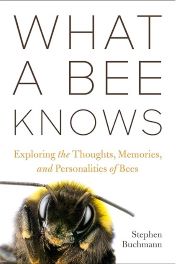What a Bee Knows

Stephen Buchmann
Island Press, £22.99
A bee’s sensory world is staggeringly different to ours, and some of their abilities surpass our own. For example, they can see UV light, smell carbon dioxide and detect electrostatic charge. They can also see fast motion – things that would appear blurred to us don’t for a bee. No wonder insects are so good at avoiding our attempts to swat them.
These are just some of the insights that are included in Buchmann’s broad introduction to the lives and evolution of bees. However, the book’s tagline promises more: ‘exploring the thoughts, memories, and personalities of bees’. The idea that bees have thoughts is much more controversial than our current thinking about their abilities and sensory capabilities. Just because a bee can learn where a patch of flowers is, it doesn't automatically follow that this memory involves any kind of conscious experience.
Buchmann is clear in his belief that bees are sentient and can feel emotions. One line of reasoning is neuroanatomy; there are neurochemical similarities between bees’ brains and human brains, with neurotransmitters such as dopamine and serotonin playing important roles.
He also describes a variety of behavioural experiments, including ones that researchers have interpreted as showing bee ‘optimism’. Bumblebees were trained to associate artificial flowers of a particular colour with a sugar reward. They were then presented with ambiguous-coloured flowers, similar but not identical to the rewarding ones they had been trained to visit. If the bees were given sugar before leaving the nest, they were quicker to land on the ambiguous flowers. Does this mean the bees that had been fed sugar were feeling more optimistic?
Such findings are intriguing, but they are hard to interpret, and many scientists do not share Buchmann’s certainty about bee sentience. This fascinating debate will no doubt continue as new experiments give valuable insights into what it might be like to be a bee.
Dr Rebecca Nesbit
Reviewed by writer, artist and ecologist Dr Rebecca Nesbit


